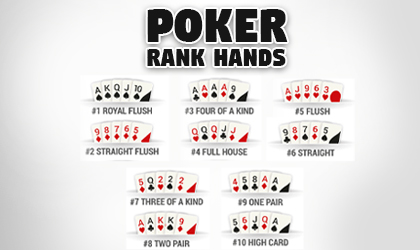What Is The Winning Hands In Poker
- Poker Hands What Beats What
- What Are The Winning Hands In Poker In Order
- What Is The Sequence Of Winning Hands In Poker
- Best Low Hand In Poker
- Printable Poker Hands Chart
If no one at the table has made a pair or higher in their hand and it gets to a showdown. Some variants of poker, called lowball, use a low hand to determine the winning hand. In most variants of lowball, the ace is counted as the lowest card and straights and flushes don't count against a low hand, so the lowest hand is the five-high hand A-2-3-4-5, also called a wheel. The probability is calculated based on.

Most Commonly Asked Poker Questions
Not sure what beats a full house or what a straight can beat? Here are the answers to the most commonly-asked poker questions this side of the Strip.
Does a flush beat a full house?

No. A full house beats a flush in the standard poker hand rankings. The odds against making a full house in a game of Texas Hold’em are about 36-to-1, while the odds against making a flush are 32-to-1. The full house is a more rare hand and beats a flush.
Does a flush beat a straight?
Yes. Using the standard poker hand rankings, a flush beats a straight, regardless of the strength of the straight. The odds against making a straight in Texas Hold’em are about 21-to-1, making it a more common hand than a flush (32-to-1 odds against).
Does a straight beat a full house?
No. The odds against making a full house in Texas Hold’em are about 36-to-1, while the odds against making a straight are about 21-to-1. Both are strong five-card hands, but a full house occurs less often than a straight. A full house beats a straight in the poker hand rankings.
Does three of a kind beat two pair?
Poker Hands What Beats What
Yes. Both three of a kind and two pair can make a lot of money in poker, but three of a kind is the best hand when it goes head to head with two pair. The odds against making three of a kind in Texas Hold’em is about 20-to-1, while the odds against making two pair is about 3-to-1.
Does three of a kind beat a straight?
No. The odds of making both of these hands are very close in a game of Texas Hold’em. The odds against making a straight are 20.6-to-1, while the odds against making three of a kind are 19.7-to-1. The straight comes about slightly less often, making it the winner against three of a kind in the poker hand rankings.
Does a flush beat three of a kind?
What Are The Winning Hands In Poker In Order
Yes. The battle of strong hands between a flush and three of a kind sees the flush as the stronger hand. The odds against making a flush in Texas Hold’em are about 32-to-1, with odds against making three of a kind at around 20-to-1.
Does a straight beat two pair?
Yes. The poker hand rankings dictate that a straight is a stronger hand than two pair. The straight occurs with about 21-to-1 odds against in Texas Hold’em, while the odds against making two pair stand at about 3-to-1.
What Is The Sequence Of Winning Hands In Poker
Does four of a kind beat a full house?
Yes. Both four of a kind and a full house are among the strongest poker hands, but four of a kind is a much rarer holding. Texas Hold’em odds against making four of a kind are 594-to-1, while you have about 36-to-1 odds against making a full house.
Does three of a kind beat a flush?
No. When the flush and three of a kind go head to head, the flush comes out as the best according to the poker hand rankings. The odds against making three of a kind sit around 20-to-1, with the odds against hitting a flush at 32-to-1.
Does a full house beat a straight in poker?
Yes. The full house comes in less often than a straight. In Texas Hold’em, the odds against drawing a full house are around 36-to-1, while the odds against making a straight are around 21-to-1.

Best Low Hand In Poker
Does a straight flush beat four of a kind?
Printable Poker Hands Chart
Yes. Four of a kind is an exceedingly rare hand in poker, but the straight flush is an even more elusive five-card hand. The odds against making a straight flush in Texas Hold’em is about 3,590-to-1, much rarer than four of a kind (594-to-1 odds against)